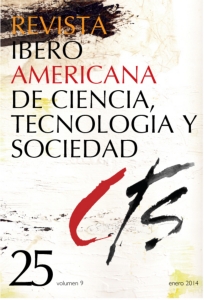Interference in the connection
ICTs in equal opportunity plans and digital agendas of Latin America
DOI:
https://doi.org/10.52712/issn.1850-0013-611Keywords:
gender and technology, new information and communication technologies, digital agendas, public policy and technologyAbstract
This paper aims to present a broad overview of the relationships between the Equal Opportunity Plans as an expression of the State’s commitment to gender equality and the ways in which the introduction, appropriation and impact of the new information and communication technologies (ICTs) are seen as issues to be addressed in such plans. Despite the enormous relevance of ICTs in the transformation of our society, there remains a long road ahead in terms of technology policies that incorporate a gender perspective. For instance, digital agendas –even those guided by the premise of social inclusion– still have to address issues concerning gender inequality.
Downloads
References
AFONSO, C. (2007): “Brasil”, en Global Information Society Watch 2007, Montevideo, APC e ITEM, pp. 119-125,
BONDER, G. (2002): “Las nuevas tecnologías de información y las mujeres: reflexiones necesarias”, Serie Mujer y Desarrollo 30, Santiago de Chile, CEPAL.
CALDERÓN, F. (2008): “La inflexión política en el cambio sociocultural de América Latina. Reflexiones sobre los problemas de gobernabilidad”, en Fernando Calderón (coordinador), Escenarios políticos en América Latina. Conceptos, métodos y Observatorio Regional, Cuadernos de Gobernabilidad Democrática 2, Siglo XXI Editores Argentina, Buenos Aires, pp. 15-101.
CAMACHO JIMÉNEZ, K. (2001): “The Internet: A Tool for Social Change? Elements of a Necessary Discussion”, Costa Rica, Fundación Accesso. Disponible en: www.acceso.org.co. Consultado mayo de 2011.
CEPAL-eLAC (2008): Compromiso de San Salvador. Aprobado en la segunda Conferencia Ministerial sobre la Sociedad de la Información de América Latina y el Caribe, Santiago de Chile, CEPAL.
DUTTA, S. y MIA, I. (2010): The Global Information Technology Report 2009-2010, Geneva, Word Economic Forum – INSEAD.
ECHEVERRÍA, J. (2008): “Apropiación social de las tecnologías de la información y la comunicación,” Revista Iberoamericana de Ciencia, Tecnología y Sociedad -CTS, vol. 4, nº 10, pp. 171-182.
FRASER, N. (2000): “Rethinking Recognition”, New Left Review, vol. 3, May/June, pp. 107-120.
FINQUELIEVICH, S. y LAGO MARTÍNEZ, S. (2004): “Mujeres en América Latina y el Caribe: ¿son las tecnologías de información y comunicación un arma efectiva para luchas contra la pobreza”, Revista Venezolana de Estudios de la Mujer, vol. 9, nº 22, pp. 129-144.
GUERRA, M.; HILBERT, M.; JORDÁN, V. y NICOLIA, C. (2008): Panorama Digital 2007 de América Latina y el Caribe. Avances y desafíos de las políticas para el desarrollo con las tecnologías de información y comunicaciones, Santiago de Chile, CEPAL.
GURUMURTHY, A. (2004): Gender and ICTs. Overview Report, Brighton, Bridge.
GUZMÁN, V. (2003): “Gobernabilidad democrática y género. Una articulación posible”, Serie Políticas Sociales, vol. 48, Santiago de Chile, CEPAL.
HILL COLLINS, P. (2001): Black Feminist Thought. Knowledge, Consciousness, and the Politics of Empowerment, Nueva York, Routledge.
HUYER, S. y SIKOSKA, T. (2003): “Overcoming the Gender Digital Divide. Understanding ICTs and their Potential for the Empowerment of Women”, Research Paper Series 1, INSTRAW.
MARINO, O. (2008): “Mexico”, Global Information Society Watch 2008, Montevideo, APC e ITEM, pp. 150-152.
MOSER, C. (1993): Gender Planning and Development: Theory, Practice and Training, London and New York, Routledge.
PEÑA MIRANDA, P. (por Mujeres en Conexión). (2008): “Chile”, en Global Information Society Watch 2008, Montevideo, APC e ITEM, pp.100-102.
PNUD/PROGRAMA DE LAS NACIONES UNIDAS PARA EL DESARROLLO (2006): Las nuevas tecnologías: ¿un salto al futuro?, Santiago de Chile, Programas de las Naciones Unidas para el Desarrollo/Chile.
PNUD/PROGRAMA DE LAS NACIONES UNIDAS PARA EL DESARROLLO (2007): Informe de Desarrollo Humano 2007/2008, New York, Palgrave Macmillan.
SABANES PLOU, D. (2004): “Las mujeres y las políticas de Internet en América Latina y el Caribe”, Revista Venezolana de Estudios de la Mujer, vol. 9, nº 22, pp. 231- 247.
TRUE, J. y MINTROM, M. (2001): “Transnational Networks and Policy Difussion. The Case of Gender Mainstreaming”, International Studies Quarterly, vol. 45, nº 1, pp. 27- 57.
UNITED NATIONS (2004): Global E-Government Readiness Report 2004. Towards Access for Opporunity, New York, Palgrave Macmillan.
WARSCHAUER, M. (2003): Technology and Social Inclusion. Rethinking the Digital Divide, London, The MIT Press.
Documentos gubernamentales
Bolivia
Plan Nacional para la Igualdad de Oportunidades. “Mujeres Construyendo la Nueva
Bolivia para Vivir Bien”. Diciembre de 2008.
Estrategia Boliviana de TIC para el Desarrollo (ETIC). 2005.
Brasil
II Plan Nacional para las Mujeres (2008).
Documentos de programas de inclusión digital.
Chile
Plan de Igualdad de oportunidades entre Mujeres y Hombres. Lineamientos Generales 2000-2010.
Agenda Digital 2004-2006
Estrategia Digital Chile 2007-2012.
México
Programa Nacional para la Igualdad entre Mujeres y Hombres 2008 – 2012 (PROIGUALDAD).
Estrategia del Gobierno Digital.
Perú
Plan de Igualdad de Oportunidades para Mujeres y Varones 2006-2010.
Plan de Desarrollo de la Sociedad de la Información en el Perú. La Agenda Digital
Peruana.
Estrategia Nacional de Gobierno Electrónico.
CODESI. Informe año 2007.
Uruguay
Primer Plan de Igualdad de Oportunidades y Derechos.
Libro Verde de la SIC en Uruguay 2007. Ana Laura Rivoir y Mauro Ríos.
Agenda Digital Uruguay 2008-2010.
Downloads
Published
How to Cite
Issue
Section
License
Copyright (c) 2024 CC Attribution 4.0

This work is licensed under a Creative Commons Attribution 4.0 International License.
All CTS's issues and academic articles are under a CC-BY license.
Since 2007, CTS has provided open and free access to all its contents, including the complete archive of its quarterly edition and the different products presented in its electronic platform. This decision is based on the belief that offering free access to published materials helps to build a greater and better exchange of knowledge.
In turn, for the quarterly edition, CTS allows institutional and thematic repositories, as well as personal web pages, to self-archive articles in their post-print or editorial version, immediately after the publication of the final version of each issue and under the condition that a link to the original source will be incorporated into the self-archive.











